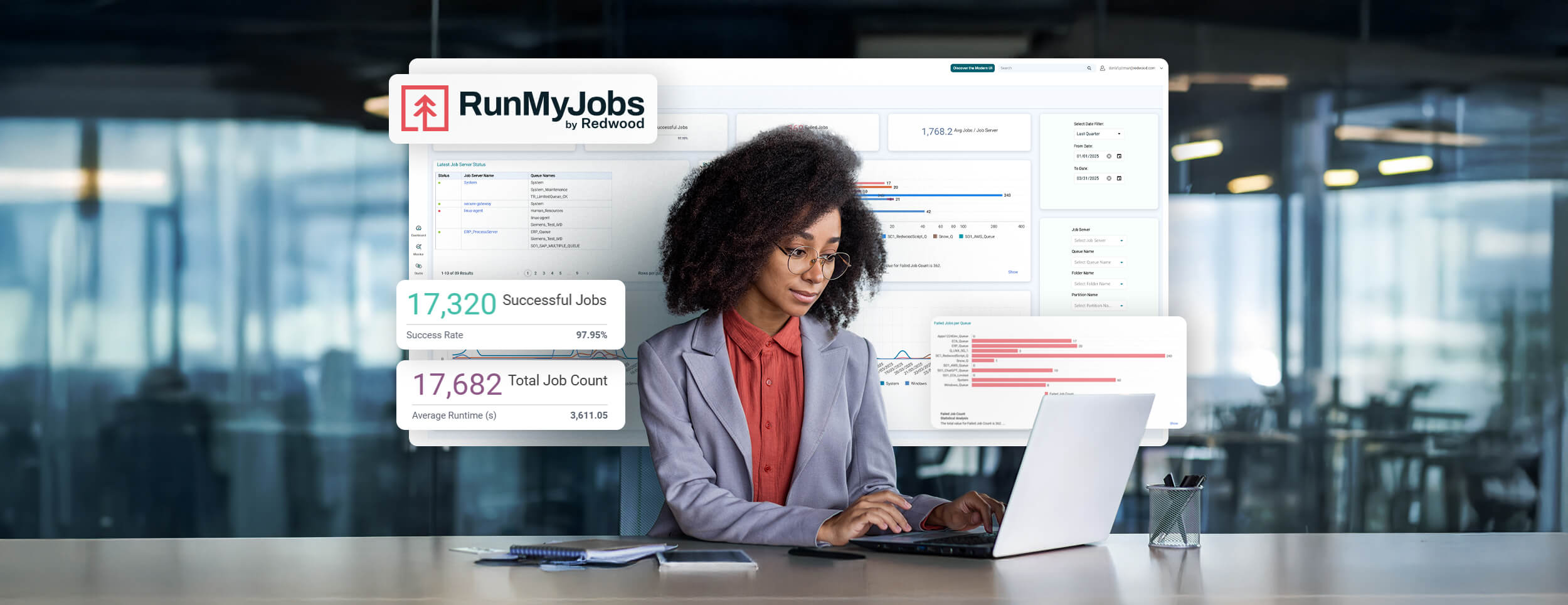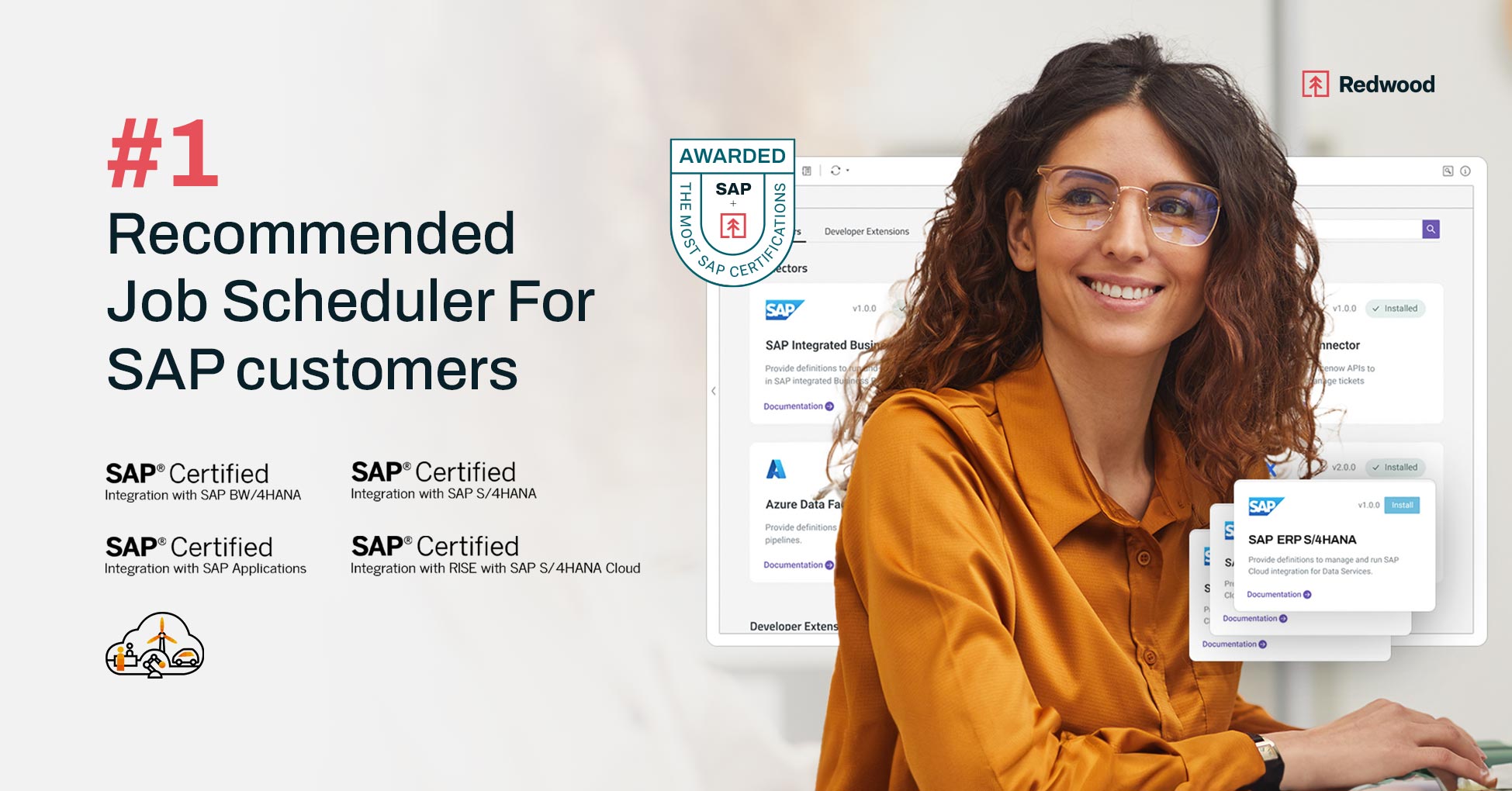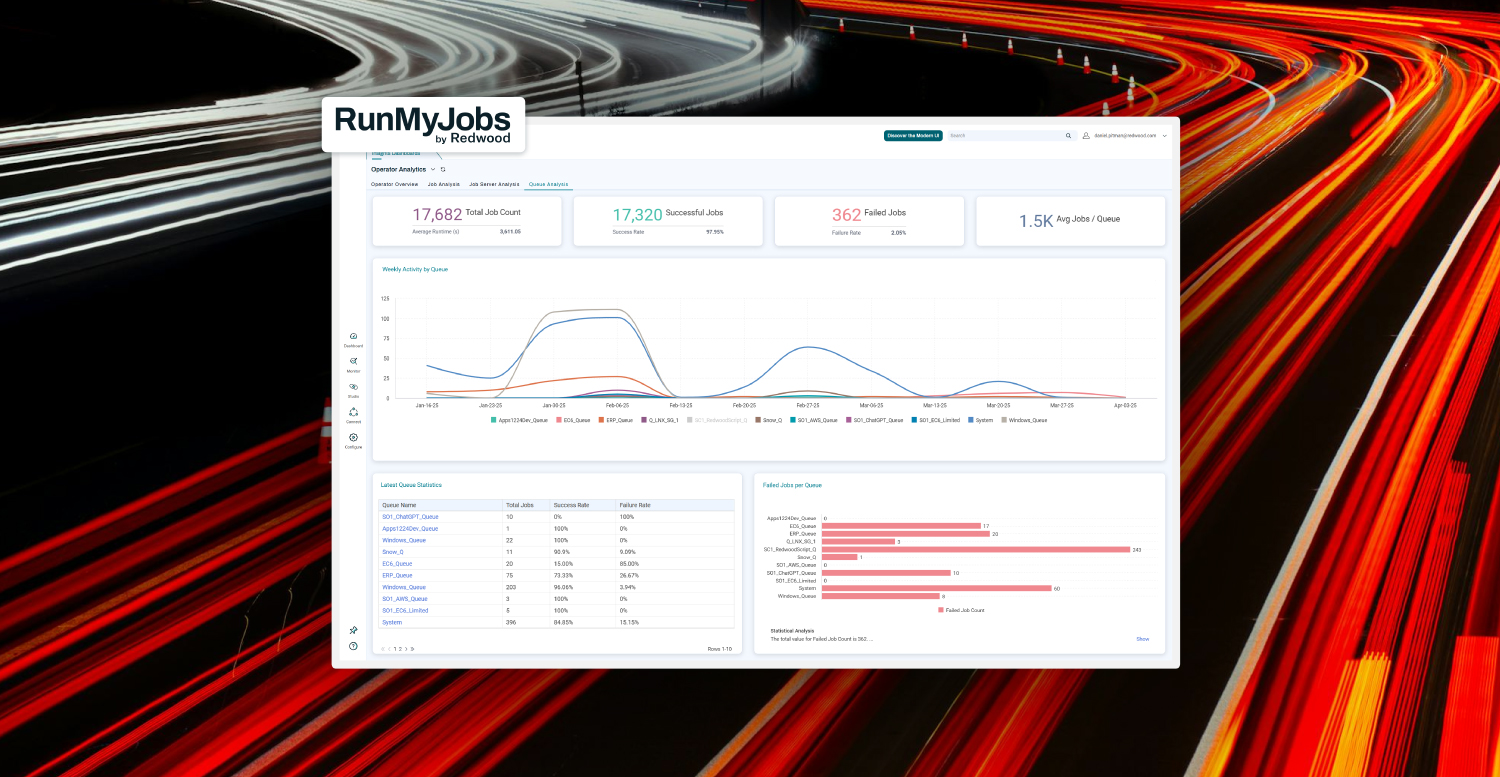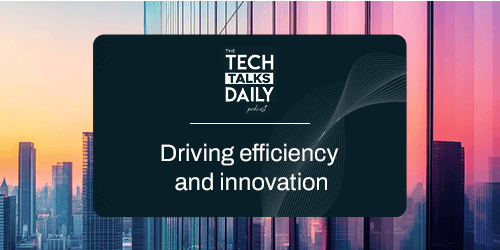Blog & Newsroom
Featured Blogs
-
 Product knowledge
Product knowledge -
-
-
 Managed file transfer
Managed file transferMeeting MFT security, reliability and compliance requirements with JSCAPE
Latest Content
-
 Support & success
Support & successCulture of curiosity: How software champions lead the charge on automation
Ignite your team's efficiency and your own career by embracing the power of continuous software learning, especially with automation platforms. Becoming a "learning champion" fosters a culture of proactive knowledge sharing, leading to increased productivity and stronger organizational impact.
-
 Product knowledge
Product knowledgeThe observable enterprise: Navigating complexity in workload automation
Gain complete control over your complex automation landscape by embracing observability principles using workload automation and SOAP platforms. Use the newly released add-on to RunMyJobs by Redwood, Redwood Insights, for unprecedented visibility, issue resolution and decision-making.
-
 SAP
SAPThe automation fabric symphony: Harmonizing SAP data for precision manufacturing
Disconnected manufacturing data can hinder your Industry 4.0 goals. A unified automation fabric powered by SAP orchestration can harmonize your data, analytics and decisions to help you achieve precision manufacturing and a competitive edge.
-
 SAP
SAPResilience in retail: How to move your SAP data to minimize waste
Minimize waste and lost revenue in your retail operations by transforming your SAP data management with proven supply chain strategies. Orchestrate disparate data sources, gain end-to-end visibility and develop an automation fabric for responsive forecasting and replenishment to maximize efficiency and profitability.
-
 Managed file transfer
Managed file transferFile transfer strategy for RISE with SAP: Clean core, compliance and control
Establishing a robust file transfer strategy for large and high-volume transfers during your RISE with SAP transformation can help you adhere to clean core principles and ensure compliance down the road. Integrate workload automation with a dedicated MFT solution to simplify these transfers in your hybrid SAP environment.
-
 Finance automation
Finance automationRethinking finance tech: People, projects and purpose
If you’re frustrated by underperforming finance technologies, it’s time to reevaluate your approach by prioritizing people and processes over the allure of plug-and-play solutions. Find out how to incrementally implement automation to achieve meaningful and lasting finance transformation.
-
 SAP
SAPEscape the data maze: Your SAP data journey from source to insight
Tired of SAP data silos, inconsistent reporting and missed opportunities? Discover how a purpose-built orchestration layer can unify your SAP and non-SAP systems, automating data flow and providing real-time insights to drive better decisions and future-proof your enterprise.
-
 Finance automation
Finance automationThe 33%: What finance leaders know but aren’t implementing
Despite 91% of finance leaders acknowledging the potential for R2R automation, only 58% have implemented it, highlighting a significant gap between awareness and action. Barriers like legacy system integration and perceived high costs necessitate a strategic, holistic approach to overcome the 33% implementation deficit and realize the full ROI of automation.
-
 Finance automation
Finance automationR2R reality check: Research shows automation lags despite demand
Despite overwhelming agreement among finance leaders that automation is crucial for efficient record-to-report (R2R) processes, research reveals a significant gap between this perception and the actual implementation, with many organizations still relying on manual efforts. Explore the reasons behind this lag and access the full report.
-
 SAP
SAPAutonomous SAP production planning — Produce more faster and maintain quality
Disconnected systems and manual processes are crippling modern manufacturing, leading to production delays, increased costs and quality issues. Intelligent orchestration with advanced workload automation complementing your SAP solutions offers you a coordinated framework that connects and synchronizes your data, processes and systems.
-
 Redwood Software
Redwood SoftwareIntroducing Redwood’s AI assistant: Instant answers, easier automation
Redwood Software’s new AI assistant delivers instant, conversational answers to your questions about Redwood products. Get faster troubleshooting and boost your productivity with this intuitive tool.
-
 Finance automation
Finance automationMore software won’t save you: Change management advice for finance
Discover how change management can drive automation success for your financial transformation and get advice for your finance automation journey.
-
 Finance automation
Finance automationStreamlining reclassifications for financial accuracy
Manual financial reclassification processes are time-consuming and error-prone, leading to potential misstatements and prolonged month-end close cycles. Automate these processes to find cost savings, improve accuracy, enhance scalability and drive faster close cycles, ultimately enabling your finance teams to focus on higher-value analysis.
-
 Finance automation
Finance automationLetting go of the ledger: How automation gives accountants more power
Automation is transforming accounting, shifting the focus from tedious manual tasks to analysis and higher-level decision-making. By embracing automation as an accountant, you can gain greater control over your work and career and become a strategic advisor, providing more valuable insights that drive business success.
-
 Finance automation
Finance automationThe power of automation in managing accruals and provisions
Automation is revolutionizing accruals and provisions management, replacing error-prone manual processes with streamlined, accurate systems. Find out how this shift enhances financial reporting accuracy, ensures compliance with regulations and provides real-time insights for better decision-making.
-
 Finance automation
Finance automationRipple effects of finance transformation: 7 real-world stories
Learn how finance transformation helped four industry leaders automate operations, reduce inefficiencies, and drive strategic growth. Discover insights and how finance automation can help your organization.
-
 Redwood Software
Redwood SoftwareThe Fortune 50’s secret weapon: Who is Redwood Software?
Redwood Software began as a small team with a vision to connect IT processes to critical business functions and evolved from a startup to an industry shaper in automation. Read the story of how Redwood overcame significant challenges across three decades to pioneer SaaS automation, cloud-native solutions and a broader approach beyond IT-centric workflows, now serving 40% of Fortune 50 companies.
-
 SAP
SAPASUG’s SAP BTP findings reveal new pathways to ROI with Redwood
ASUG's latest report highlights the growing adoption of SAP BTP, with a majority of users prioritizing integration, analytics and automation and looking ahead to ways to incorporate AI. To maximize your ROI and navigate the complexities of SAP BTP, consider how you could accelerate your innovations with RunMyJobs by Redwood.
-
 Managed file transfer
Managed file transferMFT solutions bring compliance gold to high-stakes industries
Managed file transfer (MFT) solutions are the gold standard for compliance in regulated industries due to their built-in security controls, automation and audit capabilities. Learn the risks of using obsolete solutions and why upgrading is essential for building operational resilience and avoiding the costly consequences of data breaches and non-compliance.
-
 Finance automation
Finance automation“I fear for accounting’s future,” as industry talent shortage looms
An aging workforce and declining interest have resulted in a severe accounting talent shortage. The effects are exacerbated by increasing workloads and a mismatch between education and industry needs. Learn why embracing automation and AI is the way to upskill and attract more young professionals.
-
 3-S
3-SOn-demand training: An essential thread in your automation fabric
Investing in targeted automation training is crucial if you want to fully realize the ROI of automation software. Learning Management Systems (LMS), such as that utilized by Redwood Software, offer flexible and scalable training solutions. Empower your workforce and build a competitive advantage with Redwood University’s resources at your fingertips.
-
 Finance automation
Finance automationI was a CFO — and accounting’s tech problem is worse than you think
Outdated accounting technology is hindering the profession, but many accounting teams resist upgrading their software because of risk aversion, budget concerns and misconceptions about the complexity of modernization. Hear why one former CFO advocates for using automation and AI-powered solutions to free up accountants for more strategic work.
-
 Finance automation
Finance automationHow antiquated accounting tools are failing you during tax season
Tax season stress is exacerbated by antiquated software and manual processes. Given the current shortage of skilled professionals, the high cost of rework and errors and the limitations of manual processes in scaling to meet demand, automating accounting is becoming non-negotiable for forward-thinking organizations.
-
 Managed file transfer
Managed file transferStop reacting, start protecting: Your data deserves zero-trust security
Read more about zero-trust security including core principles and how to develop a cloud-native security strategy. Discover how to build a proactive file transfer security approach to move critical data without the risk of security breaches.



